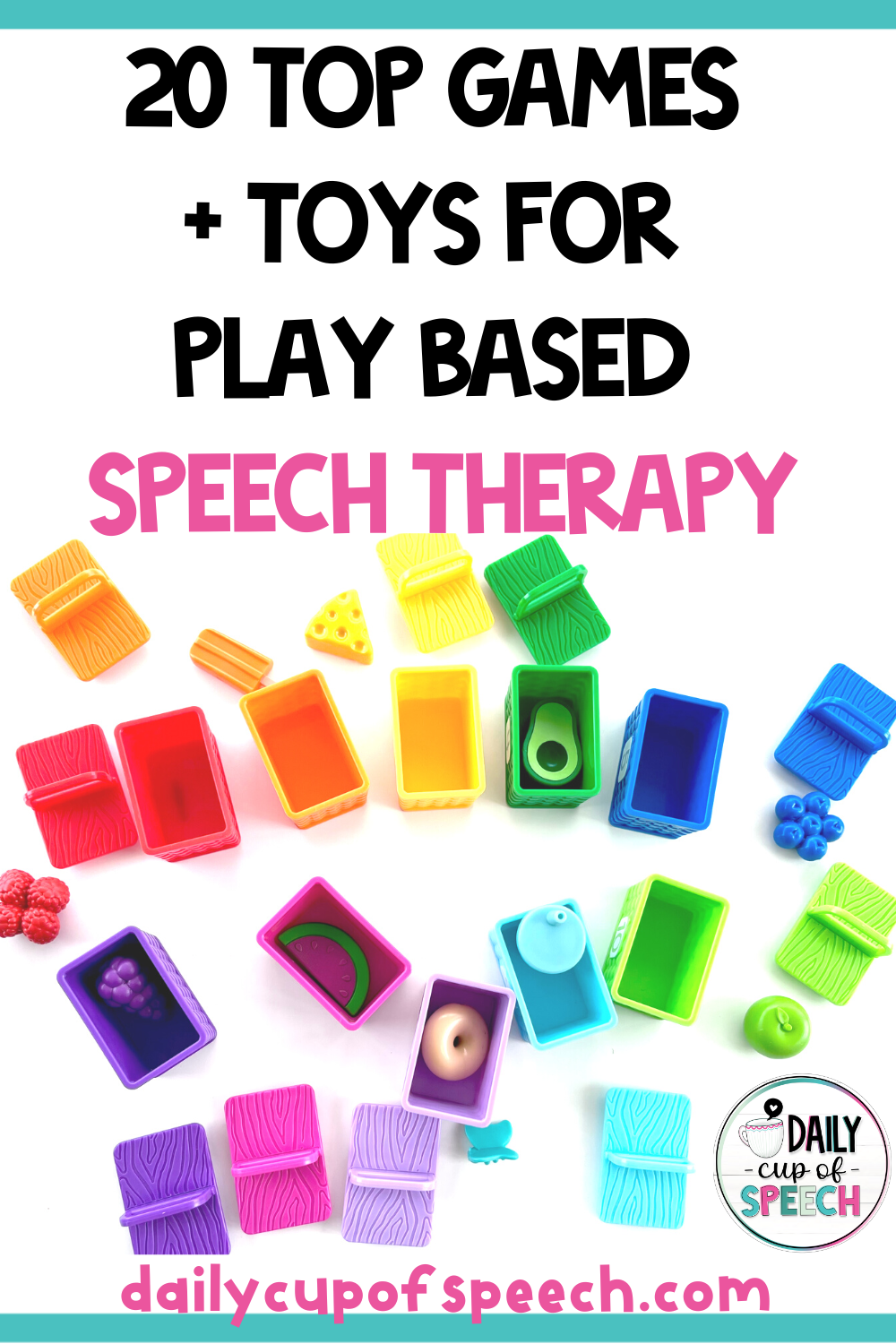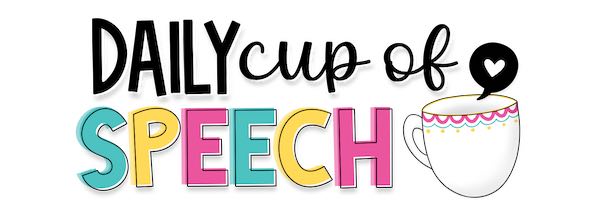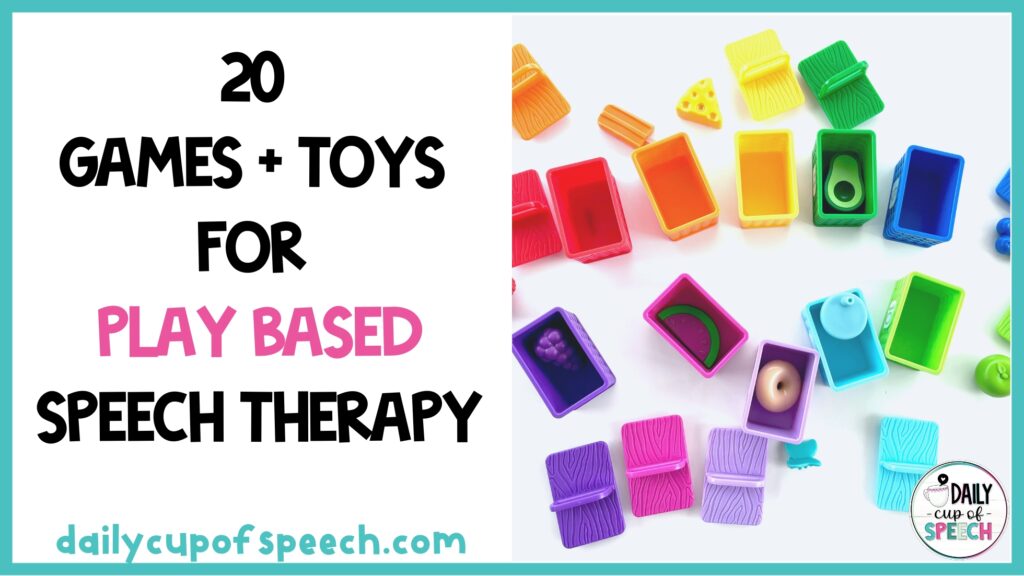Using games and toys to target language, speech and social skills
As a pediatric speech therapist I have found using toys and games in speech therapy are some of the best ways to target a variety of speech and language skills!
The fun games and activities included in this blog post are great to incorporate into your speech therapy sessions and can be adapted to target so many goals such as: wh- questions, basic concepts, word retrieval, expressive language goals, critical thinking, joint attention, social skills, identifying facial expressions, word relationships, deductive reasoning, turn-taking skills, body language, speech sounds and more! Play-based activities are perfect for learning new skills and practicing the carryover of learned skills.
In this blog post, I’m sharing what many speech pathologists have shared to be their favorite games (including board games, card games, and non-traditional games), as well as toys that are great to incorporate into your sessions while working on social skills, language skills + goals, speech sounds, target words, and with other speech therapy activities! There are so many great games and toys to use in speech therapy that it was hard to narrow down! Included in this round-up are both new games + toys and some classic ones!
For both school-based slps doing group therapy sessions and private practice slps, a play-based therapy session can be highly effective! Collaborating with family members and using the child’s interests is very important. A visual schedule can help both young children and older children know expectations and what will be happening in the play-based session.
As an Amazon affiliate, my small business (Daily Cup of Speech) may receive a small commission from links in this blog post. This has no impact on the price for you! Click on any of the game/toy titles or pictures to be taken to the product on Amazon!
Using games to target social skills in speech therapy
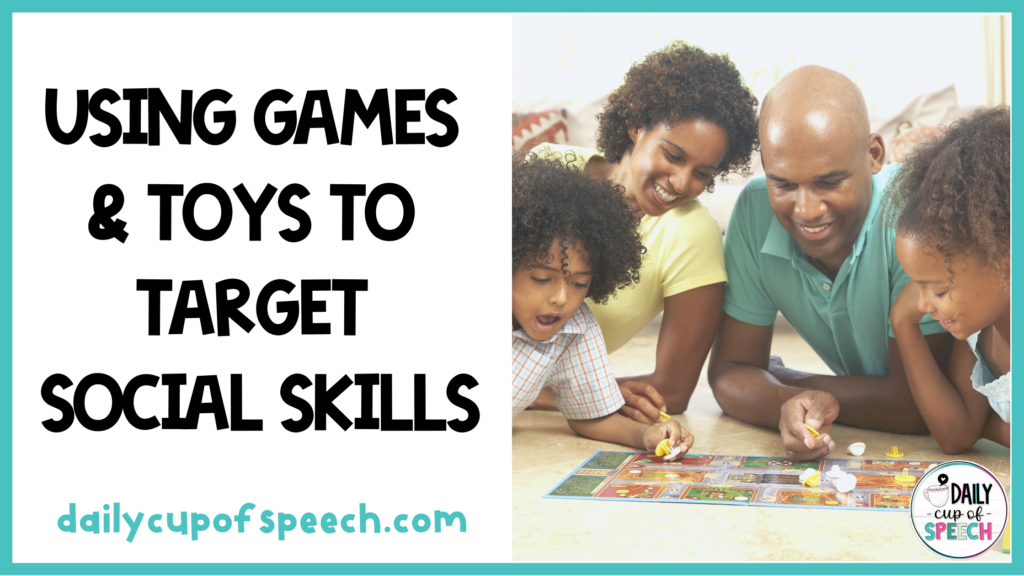
I love using games to practice social skills and work on speech therapy goals. Common goal targets such as identifying facial expressions, body language, and turn-taking skills can all be targeted with any toy or game. Going over the rules of the game, the object of the game, describing how someone feels when they win or lose in a game, and appropriate ways to respond (when you win or lose) are all things that can be incorporated into play activities.
Favorite games and toys for speech therapy
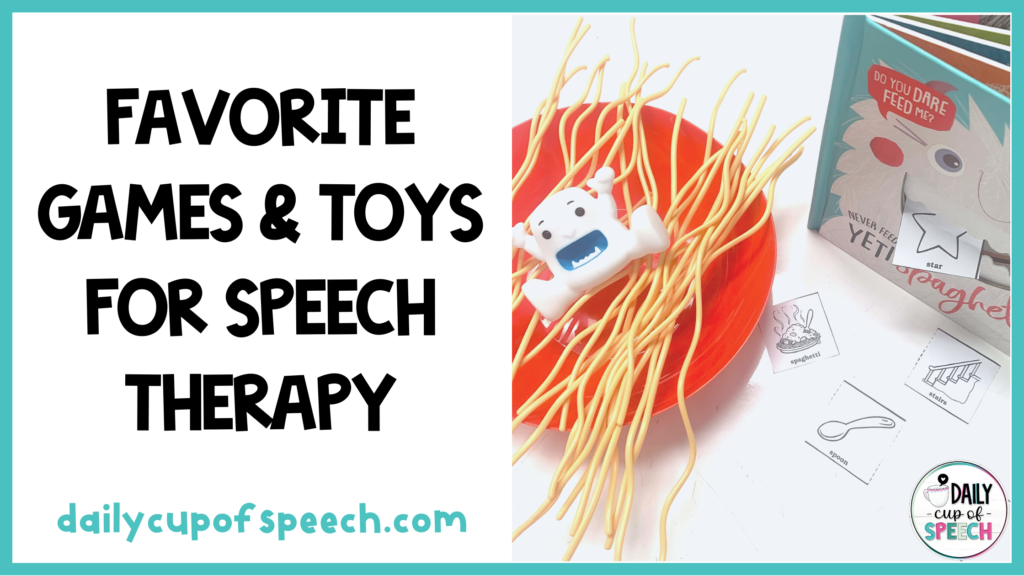
All of these toys and games below can be used in different ways to target a wide variety of goals + skills such as expressive and receptive language, speech sound production, imitation skills, sentence structure and more. Play-based speech therapy can be very engaging and also effective! Playing with toys can provide a ton of language opportunities. Speech-language pathologists often incorporate games into sessions as a fun way to work on speech and language goals.
I have found that using a variety of game types can help with engagement and interest. Many of these games are not classic board games with pieces that you move around on a game board. Many require you to push a button, flip a card, or stack a piece. Games can also be great for practicing fine motor skills. While many of these toys and games are geared toward preschool and younger-aged children, some games may be appropriate for older children (i.e. Headbandz, Connect 4, etc.) Using the child’s lead when selecting a play based activity can be very helpful for engagement. Using open-ended activities is also great for social interactions in play-based therapy sessions
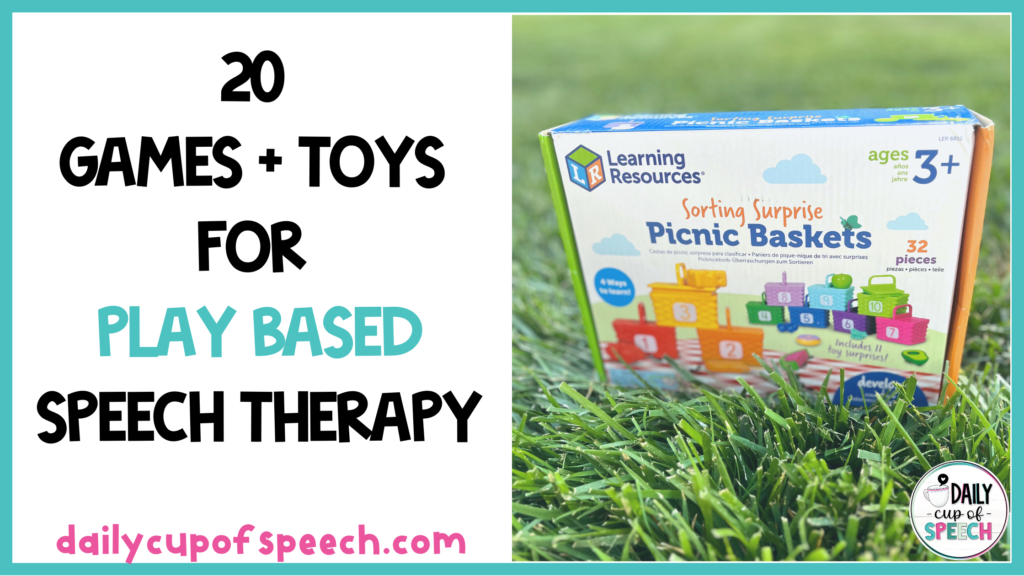
This toy includes colorful presents with mini objects inside of them! Children love the “surprise” aspect of this toy. My favorite goals to target with this toy set are describing and basic concepts.
Skills to target:
-describing by attribute (categories, color, etc.)
-wh questions
-basic concepts (qualitative, quantitative, temporal, spatial)
-speech sounds
Ball towers are a great hands-on activity children love! These are often popular for early intervention through preschool age children. They are a great cause and effect toy and easy to incorporate core vocabulary into while using.
Skills to target:
-basic concepts (qualitative, quantitative, temporal, spatial, color)
-core vocabulary (go, up, down)
-expressive language (increasing utterance length)
-requesting
-speech sounds
This surprise picnic baskets toy by Learning Resources is always a favorite! There are SO MANY ways this toy can be used! It is perfect for basic concepts (sorting by colors, describing by attributes, spatial concepts) and so much more! Children love seeing what is hiding inside each picnic basket.
Skills to target:
-basic concepts (qualitative, quantitative, temporal, spatial, color)
-core vocabulary (in, out, open, close)
-expressive language (expansion)
-requesting
This popular toy is so much fun! Children love using the key to unlock the doors at the “vet” to find the cat and dog! This is a favorite and popular toy for play-based speech therapy!
Skills to target:
-describing by attribute (categories, color, etc.)
-wh questions
-basic concepts (qualitative, quantitative, temporal, spatial)
-turn taking
I came across this emotions pineapple toy last year and knew right away I had to have it for targeting identifying emotions in speech therapy! It is a spin on the classic “Potato Head” toys but instead of accessories, includes different pieces to put a variety of feeling expressions on the pineapple.
Skills to target:
-asking and answering wh questions
-identifying emotions and feelings
-situations or scenarios when someone may feel a specific emotion
If you are looking for more ideas for teaching emotions check out this blog post as well as the year-round emotions unit in my TpT store!
Reusable sticker pads are great for targeting so many goals! They are built-in picture scenes but hands-on since the stickers can be repositioned. Children love designing the scenes which makes it easy to ask questions about the pictures.
Skills to target:
-describing by attribute (categories, color, etc.)
-wh questions
-basic concepts (qualitative, quantitative, temporal, spatial)
-following multi-step directions with basic concepts
A classic farm set is always great for early childhood and younger children. Talking about what sounds the animals make, describing other attributes about the farm animals and barns (i.e. color, size, shape, etc.) and what happens on a farm are just a few of the ways to use a farm toy.
Skills to target:
-describing by attribute (categories, color, etc.)
-wh questions
-basic concepts (qualitative, quantitative, temporal, spatial)
-speech sounds
-turn taking
Pop up Pirate and Pop the Pig are two favorites to use in speech therapy. Put stimuli cards under the swords (or burgers) and have children complete their trials before taking their turn in the game.
Skills to target:
-describing by attribute (i.e. color)
-wh questions
-speech sounds (great for targeting r and vowel r)
-requesting
This I-Spy game is perfect for describing! Children dig and see what they “spy”. Once they find an item, have them describe all of the attributes (i.e. color, category, what it’s used for, what it looks like, etc.)
Skills to target:
-describing by attribute (categories, color, etc.)
-wh questions
-following multi-step directions
Zingo is like bingo but with pictures! This game is great for answering wh- questions and describing. It can also be used for targeting speech sounds by having children look for their targets on their cards and make a sentence on their turn (i.e. z, s-blends)
Skills to target:
-describing by attribute (categories, color, etc.)
-wh questions
-speech sounds
This squirrel game is great as a reinforcer or paired with stimuli cards! Put stimuli cards under the acorns or have students take a turn working on their goals, then have them spin and take a turn in the game.
Skills to target:
-turn taking
-speech sounds
Children think this Yeti game is hilarious and it is perfect for targeting “s-blends” in speech therapy! Have students make up sentences about the Yeti incorporating their target sounds/words. This game is also great for following multi-step directions and spatial concepts.
Skills to target:
-s-blends
-spatial concepts
-following directions
-where questions
This snack shack game is similar to the sneaky squirrel game and children love it! Put stimuli cards under the included dog bones or give children a bone each time they work on their targets.
Skills to target:
-describing by attribute (categories, color, etc.)
-wh questions
-basic concepts (qualitative, quantitative, temporal, spatial)
-speech sounds
This classic game is a fun to play at the end of the session or during a season for a quick break! You can also incorporate turn taking, answering questions and more with Connect Four. To incorporate goal targets, use small pieces of tape and write stimuli on the tape to stick on each game piece.
Skills to target:
-speech sounds
-wh questions
-turn taking
This game tends to be a hit with older children as well as younger ones. Depending on the age it may be too difficult for your youngest students. This game is great for working on a variety of goals. You can also use sticky notes to make your own cards (i.e. articulation stimuli).
Skills to target:
-turn taking
-describing by attribute (categories, color, etc.)
-wh questions
-speech sounds
This game includes foods and shape cards children have to fill. It is great for describing, receptive and expressive identification, and some of the early basic concepts (i.e. identifying colors and shapes).
Skills to target:
-describing by attribute (categories, color, etc.)
-wh questions
-basic concepts (qualitative, quantitative, temporal, spatial)
Another game similar to Sneaky Squirrel, this Sophie’s Seashell game includes seashell pieces that have to be picked up. Pair this game with stimuli cards under the shells or use as a reinforcer after the desired number of trials have been completed!
Skills to target:
-following multi-step directions
-turn taking
Anything by Educational Insights often is a hit in the speech room! This fun pancake game includes special toppings that have to be sequenced into the indicated order on the pancakes.
Skills to target:
-temporal sequencing
-following multi-step directions
-describing by attribute (categories, color, etc.)
-wh questions
-basic concepts
Don’t Break the Ice is a popular game and is perfect to pair with winter speech therapy themes! I usually will work on each child’s target skills then let everyone take a quick turn before getting in more trials. This game tends to get a big reaction from children (i.e. when the ice breaks) and may not be the best if you share a room or need a quieter game!
Skills to target:
-use as a reinforcer or pair with articulation stimuli cards
I saved the best for last! MAGNA-TILES are one of my favorite toys to use in speech therapy and at home! They are open-ended and encourage imaginative play. You can incorporate them into any activity/lesson. One idea is to build a box with MAGNA-TILES and put mini objects all around the box and work on spatial concepts. You can also pair MAGNA-TILES with stimulus cards underneath each tile.
Skills to target:
-spatial concepts (on, under, next to, etc.)
-qualitative concepts (size, color, shape)
-quantitative concepts (more, less, all, none)
-pair with articulation stimuli cards or mini objects
If you have a ton of mixed groups in speech therapy, games are a great activity that can be adapated to target your individual student’s needs.
For example, if one student is working on describing attributes and another student on answering wh- questions, select a game and grab any stimuli you will use to assist with targeting the goals (i.e. question list, picture cards, mini objects, etc.) After you get the desired number of trials with the first student, have them roll the dice or take their turn with the game, while you start with the second student’s trials.
If everyone in the group is working on the same goals, it is easier to incorporate the stimuli into a game (i.e. put the cards picture down under the game tokens (i.e. hamburgers in Pop the Pig) and have them answer the questions under each hamburger before they take their turn.
Play Based Speech Therapy Sessions
Another thing I love about using games in speech is that they do not always have to be long to have an impact. Even simple games such as tic tac toe can be a fun (free) game to play while working on speech and language skills.
Open-ended games are great for conversational skills. Skills such as asking questions, staying on topic, joint attention, and turn-taking skills can all be worked on while playing with games and toys. Social skills can also be incorporated into classic games such as identifying body language and facial expressions. Play-based speech therapy sessions with toys allow for many opportunities for working on these skills as well in less structured (i.e. drilling) and instead more natural context.
Utilizing toys and games in the speech room is a fun way to target a variety of skills for younger and older children. When working on language development play based sessions can help with engagement and result in more trials if a child is highly interested in the session activities.
Family Game Nights for At Home Practice
For children with social skill and language goals, recommending family game nights to parents is a great way for continued practice at home!
There are my classic games that are just as fun that younger children and older children enjoy! Some other games not mentioned above that families may already have at home include Candy Land, matching games, Crocodile Dentist, Ned’s Head, and more!
Ask your students what their favorite games and/or toys are to play with at home! Talk to parents about ways they can incorporate the skills being worked on in daily activities and even into a game night they may already be doing at home!
Looking for additional toys or games? Want to see a list of some of my favorite books to use in speech therapy? Check out my Amazon lists HERE!
